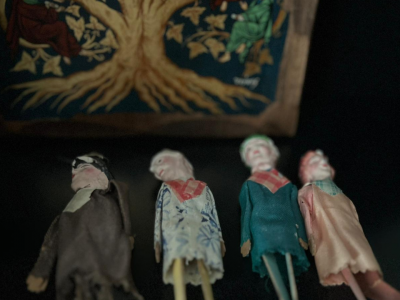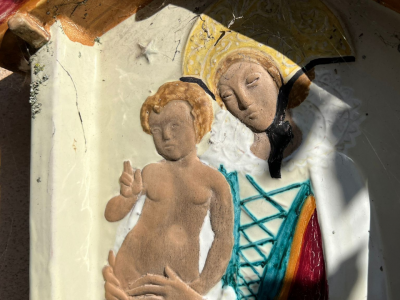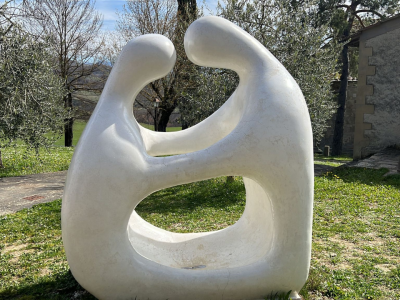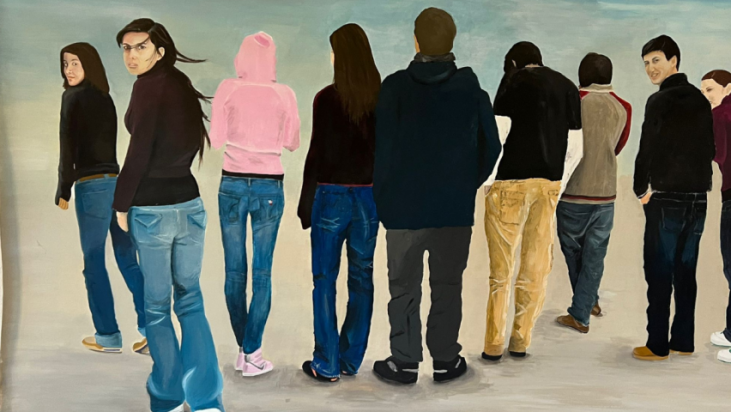stdClass Object
(
[id] => 18622
[title] => And the women saved God
[alias] => and-the-women-saved-god
[introtext] => CounterEconomy/10 - They prayed silent and beautiful prayers with their tears, kisses and hands
By Luigino Bruni
Published in Avvenire 07/05/2023
Where is the love of God, however embryonic, crude, raw, obscured, hidden underground and not out in the open as it may be, for therein is the heart however wounded of man; and it is thought that therein is God, and therefore piety
Giuseppe De Luca, Introduction to the Italian archive of the history of piety (Introduzione all’archivio italiano della storia della pietà), p. XXI
The path of CounterEconomy ends here today, with the great female subversion of popular piety. It is also the end for this third Sunday page.
Theological metaphors are indispensable and dangerous. In the face of my criticism, many readers and some theologians have reiterated these past few weeks the need for economic-commercial metaphor to understand the Christian revelation. Because it can be found in the New Testament and even St. Paul uses it.
[fulltext] =>
In fact, in the First Letter to the Corinthians we even find the word price: «You were bought at a price» (1 Corinthians 7,23). A phrase, that among other things was beloved and very "dear" to theologian Dietrich Bonhoeffer, who put salvation "at a high price" in contrast with "cheap" convenient salvation. Other metaphors can be found in Paul's letters, however, among these a sport related one: «Do you not know that in a race all the runners run, but only one gets the prize?... Therefore I do not run like someone running aimlessly; I do not fight like a boxer beating the air» (1 Corinthians 9, 24-26). However, no one, ever thought while reading these sports images that boxing or running were essential or necessary to explain Paul's theology. Nor has any theologian (yet) ever thought of describing Christian life or the Church as an athletic race or a boxing fight, where "only one gets the prize". Instead, the sports metaphor has been used partially without ever really pushing it all the way. Surprisingly, however, what has never been done with sport is still being done with the economy, which is much more loved by theologians than by economists. Some theologians have fallen so in love with economics that they do not only use it in a general and partial sense; they use it in its entirety and imagine "the economy of salvation" as an exchange of equivalents, as an actual business contract - Jesus paid the price, his own blood, to purchase salvation from his Father. Biblical metaphors, on the other hand, are the dawn of discourse, its beginning. The other half must remain unsaid, in order not to end up imprisoned by language: only partial metaphors work, because, being incomplete, they leave a free space between the mystery of God and our theological ideas. Metaphors that are exploited to the end devour the mystery that they would like to reveal.
These past few weeks, we have encountered, here and there, the theme of popular piety. As Don Giuseppe de Luca, who wrote the most beautiful pages on piety, said, «in Christian life pietas thus conceived coincides, not so much with asceticism or mysticism, nor so much with devotion or devotions, as it does with “Caritas”» (Introduction to the Italian Archive of the History of Piety, p. XIII). Piety would thus be a matter of love, of agape. As it indeed has been, perhaps the greatest there ever was.
Without the immense movement of piety, for example, we would not have developed the infinite number of social works, hospitals and schools in Catholic countries: «While the large colleges educated the nobility and the wealthy great bourgeoisie, the popular schools, from Calasanz to De la Salle, looked after the common people. Together the charitable works "de fonte pietatis" arose» (Introduction to the Italian Archive of the History of Piety, p. LXI). The hugs and kisses offered to church statues became hugs for men and women of flesh and blood. Even if, as De Luca points out, all major processes end up generating their share of undesirable effects: «From the 17th century onwards there has been an ever-growing effort to help the indigents, orphans, sick people and invalids. To the point of inducing the suspicion that such a large amount of charity could very well end up crushing the concept of justice in the hearts of men, which have always had very little room for it. It is much more pleasing to be generous than just» (ibid). In modern Europe, we have seen many different views on the reasons for helping the poor. On the one hand, we have the pastors, saints and benefactors who set up institutions of assistance with the aim of ensuring that those in conditions of poverty would soon be able to emerge and be free from them. On the other hand, we have those mentioned by De Luca, who were less concerned with poverty and saw aiding the poor as a good work for the salvation of the rich: «God could have made all men rich, but he wanted the poor so that the rich would have the opportunity to redeem their sins» (“The life of Saint Eligius”, quoted in B. Geremek’s The Mercy and the gallows. History of Poverty and Charity in Europe, 1986, p. 9). This is an idea that has reached Catholic faith in modern times: «The poor will be saved by patiently suffering their poverty and patiently asking for help from the rich. The rich will find how to redeem their sins by bringing compassion towards the poor... For the rich it is an indispensable duty to give alms to the poor because their salvation depends on it» (Sermons of the Cure of Ars, Vol. 1, p. 77). Thus, this vision of piety has the tendency, in good faith, to perpetuate the division between rich and poor.
The other idea of how to aid the poor was instead that of the pawnshops of the Franciscans called, not surprisingly, Monti di Pietà. In the age of the Counter-Reformation, the Monti di Pietà also experienced a decline. They were no longer linked to the Franciscan world and the friars became the chaplains. Starting from the seventeenth century the Monti gradually became extinct; those that survived were transformed into pawnshops with residual or assistance functions (I thank Fra Felice Autieri for this piece of information).
Nevertheless, popular piety was something much greater than these already great things. Greater because it was something small, tiny. The books of piety, written by bishops and theologians, recounted an idea of a distant, severe God, wholly concerned with preparing the tribunal for the final judgement. Popular catechism taught people that the «purpose of man» was «to serve God» in view of a future salvation (Spiritual exercises for nuns/Esercizi spirituali per nunne, Il Buon Pastore, Lodi, 1911, p. 20). The «purpose of woman» was then derived from the purpose of man: «God created woman to console Adam» (p. 28). For the nuns, who obviously did not have an Adam, the goal had to be further evolved and thus became «to save the souls of others», in particular (in that Institute) the souls of girls: «What purpose did God have in creating so many poor girls? To ensure Paradise for them» (p. 43). Religion transformed into inhumanism, where the love of God generated a lack of love for human created things.
In this religion wholly oriented towards the "things up there", popular piety became an immense collective exercise of subversion, a path of salvation for the "things down here". In its own way, it was a wonderful hymn to life. Those statues with the stupendous faces of Mary and Jesus, those images of male and female saints who looked very much like them, and their sons and daughters, those baroque churches populated by cherub-angels and by an infinity of baby-Jesus more numerous than the actual crucifixes, were the true protagonists of the other religion of the people, they were the different and good face of God - piety was the popular Counter-Counter-Reformation, it was the subversive and mild response of women to the over clericalization of religion.
90 or 98% of the people, especially those from the countryside, mountain areas ad villages, could not read prayer books, nor did they have the money to buy them. Those things were for educated people, for the priests, perhaps even for the nuns and sisters who were the great victims of the Counter-Reformation, mortified by a non-biblical faith wholly oriented towards the paradise of souls which transformed the land of their monasteries into a hell for the body. Nevertheless and herein lies the checkmate of Providence, the common people, especially women, were actually protected by their illiteracy and thus remained (almost) immune from that theology that was too divine to be human as well.
Not knowing how to read books and educated prayers forced them to invent their own prayers, and they were stupendous. Every now and then, they would end up being captured by the ancient rites of the evil eye and magic that we have talked about. However, in many other instances, they invented their own words and images to talk to God: and the spectacle of popular piety was born, which was a great place of freedom, especially for women in a world that remained one of servitude for them. They went to Church, and they pretended to answer the incomprehensible prayers and the Latin expressions of the priests, but different, whispered, words and sounds came out of their hearts and from their mouths. And, above all, they cried: they wet those statues with all their tears until they consumed their colours, wood and stucco. They prayed with their tears and above all with their kisses and hands. Beautiful silent prayers made of caresses and kisses, with gnarled and black hands which, however, knew how to truly touch the statues of the saints, of the Madonna, and above all of the angels and the cherubs, kisses and caresses that they never received from anyone at home, because they were too terrestrial to be religious. And in those beautiful angels they saw their too many stillborn children, their children who had flown away, children and young boys and girls. Thus, they defeated those absurd theologies which, in order to raise God, had bring down men and women. Moreover, they transformed the praises of the Madonna (“Woman of Paradise” by Jacopone da Todi) into beautiful songs to their dead children: «My child, my lovely lily, my baby with joyful eyes, child of a dark mother, child of disappearance, poisoned child, my baby: who do I cling to? You have forsaken me, my child, for you hide from my bosom, oh you are nursed» (quoted in De Martino, Death and ritual mourning/Morte e pianto rituale, p. 341).
The Catholic faith is still alive, even if gravely ill, above all thanks to these women of the people who humanized it with their piety, with their kisses and their caresses, saving it with their transgression: «The Virgilian golden branch is pietas» (De Luca, Introduction to the Italian Archive of the History of Piety, p. LXVI). Thus, with their hands and their kisses, they truly touched God, and they wrote their beautiful popular "kerigma", different from those of catechism, but with the smell and fragrance of life and bread: «Christ was sown by the Creator, he sprouted, he was harvested, bound in a sheaf and he was brought to the threshing floor. There he was threshed, sifted, ground, put in a furnace and after three days taken out and eaten like bread» (quoted in De Martino, Death and ritual mourning, p. 343).
This brief series on the Economy of the Counter-Reformation ends today, and the long season of my third Sunday page, lasting over ten years, ends here as well. A wonderful adventure: I saw angels ascending and descending the heavenly ladder, I learned the Bible (fifteen books of the Old Testament with commentary), charisms and vocations. I discovered a different economy and perhaps even a God who is closer to the heart of the poor. We learned together in a tenacious weekly journey, which despite everything never stopped. A collective journey that began thanks to the risky and perhaps prophetic trust shown by Marcus Tarquino, who had the courage to entrust the biblical comments to an economist. And together, today we close, we must close, it could not be any other way, because this work was a real work in tandem, from the choice of the subjects to the titles and subtitles of each article, all revised by him down to every comma. Best of wishes to the new director, Marco Girardo. May he be able to continue the show of creative faithfulness in the "Avvenire" in the season that ends today. In cases such as this, a heartfelt thank you is mandatory; nevertheless, it is always too little and never enough. A part of the story has come to an end, but the story goes on.
[checked_out] => 0
[checked_out_time] => 0000-00-00 00:00:00
[catid] => 1167
[created] => 2023-05-06 18:54:20
[created_by] => 64
[created_by_alias] => Luigino Bruni
[state] => 1
[modified] => 2023-05-19 18:23:19
[modified_by] => 64
[modified_by_name] => Antonella Ferrucci
[publish_up] => 2023-05-06 20:23:37
[publish_down] => 0000-00-00 00:00:00
[images] => {"image_intro":"","float_intro":"","image_intro_alt":"","image_intro_caption":"","image_fulltext":"","float_fulltext":"","image_fulltext_alt":"","image_fulltext_caption":""}
[urls] => {"urla":false,"urlatext":"","targeta":"","urlb":false,"urlbtext":"","targetb":"","urlc":false,"urlctext":"","targetc":""}
[attribs] => {"article_layout":"","show_title":"","link_titles":"","show_tags":"","show_intro":"","info_block_position":"","info_block_show_title":"","show_category":"","link_category":"","show_parent_category":"","link_parent_category":"","show_associations":"","show_author":"","link_author":"","show_create_date":"","show_modify_date":"","show_publish_date":"","show_item_navigation":"","show_icons":"","show_print_icon":"","show_email_icon":"","show_vote":"","show_hits":"","show_noauth":"","urls_position":"","alternative_readmore":"","article_page_title":"","show_publishing_options":"","show_article_options":"","show_urls_images_backend":"","show_urls_images_frontend":"","helix_ultimate_image":"images\/2023\/05\/06\/230507-ContrEconomia_ant.jpg","helix_ultimate_image_alt_txt":"","spfeatured_image":"images\/2023\/05\/06\/230507-ContrEconomia_ant.jpg","helix_ultimate_article_format":"standard","helix_ultimate_audio":"","helix_ultimate_gallery":"","helix_ultimate_video":"","video":""}
[metadata] => {"robots":"","author":"","rights":"","xreference":""}
[metakey] =>
[metadesc] =>
[access] => 1
[hits] => 2052
[xreference] =>
[featured] => 1
[language] => en-GB
[on_img_default] =>
[readmore] => 12070
[ordering] => 0
[category_title] => IT - ContrEconomia
[category_route] => economia-civile/it-contreconomia
[category_access] => 1
[category_alias] => it-contreconomia
[published] => 1
[parents_published] => 1
[lft] => 88
[author] => Luigino Bruni
[author_email] => ferrucci.anto@gmail.com
[parent_title] => Economia Civile
[parent_id] => 1024
[parent_route] => economia-civile
[parent_alias] => economia-civile
[rating] => 0
[rating_count] => 0
[alternative_readmore] =>
[layout] =>
[params] => Joomla\Registry\Registry Object
(
[data:protected] => stdClass Object
(
[article_layout] => _:default
[show_title] => 1
[link_titles] => 1
[show_intro] => 1
[info_block_position] => 0
[info_block_show_title] => 1
[show_category] => 1
[link_category] => 1
[show_parent_category] => 1
[link_parent_category] => 1
[show_associations] => 0
[flags] => 1
[show_author] => 0
[link_author] => 0
[show_create_date] => 1
[show_modify_date] => 0
[show_publish_date] => 1
[show_item_navigation] => 1
[show_vote] => 0
[show_readmore] => 0
[show_readmore_title] => 0
[readmore_limit] => 100
[show_tags] => 1
[show_icons] => 1
[show_print_icon] => 1
[show_email_icon] => 1
[show_hits] => 0
[record_hits] => 1
[show_noauth] => 0
[urls_position] => 1
[captcha] =>
[show_publishing_options] => 1
[show_article_options] => 1
[save_history] => 1
[history_limit] => 10
[show_urls_images_frontend] => 0
[show_urls_images_backend] => 1
[targeta] => 0
[targetb] => 0
[targetc] => 0
[float_intro] => left
[float_fulltext] => left
[category_layout] => _:blog
[show_category_heading_title_text] => 0
[show_category_title] => 0
[show_description] => 0
[show_description_image] => 0
[maxLevel] => 0
[show_empty_categories] => 0
[show_no_articles] => 1
[show_subcat_desc] => 0
[show_cat_num_articles] => 0
[show_cat_tags] => 1
[show_base_description] => 1
[maxLevelcat] => -1
[show_empty_categories_cat] => 0
[show_subcat_desc_cat] => 0
[show_cat_num_articles_cat] => 0
[num_leading_articles] => 0
[num_intro_articles] => 14
[num_columns] => 2
[num_links] => 0
[multi_column_order] => 1
[show_subcategory_content] => -1
[show_pagination_limit] => 1
[filter_field] => hide
[show_headings] => 1
[list_show_date] => 0
[date_format] =>
[list_show_hits] => 1
[list_show_author] => 1
[list_show_votes] => 0
[list_show_ratings] => 0
[orderby_pri] => none
[orderby_sec] => rdate
[order_date] => published
[show_pagination] => 2
[show_pagination_results] => 1
[show_featured] => show
[show_feed_link] => 1
[feed_summary] => 0
[feed_show_readmore] => 0
[sef_advanced] => 1
[sef_ids] => 1
[custom_fields_enable] => 1
[show_page_heading] => 0
[layout_type] => blog
[menu_text] => 1
[menu_show] => 1
[secure] => 0
[helixultimatemenulayout] => {"width":600,"menualign":"right","megamenu":0,"showtitle":1,"faicon":"","customclass":"","dropdown":"right","badge":"","badge_position":"","badge_bg_color":"","badge_text_color":"","layout":[]}
[helixultimate_enable_page_title] => 1
[helixultimate_page_title_alt] => Economia Civile
[helixultimate_page_subtitle] => ContrEconomia
[helixultimate_page_title_heading] => h2
[page_title] => CounterEconomics
[page_description] =>
[page_rights] =>
[robots] =>
[access-view] => 1
)
[initialized:protected] => 1
[separator] => .
)
[displayDate] => 2023-05-06 18:54:20
[tags] => Joomla\CMS\Helper\TagsHelper Object
(
[tagsChanged:protected] =>
[replaceTags:protected] =>
[typeAlias] =>
[itemTags] => Array
(
[0] => stdClass Object
(
[tag_id] => 18
[id] => 18
[parent_id] => 1
[lft] => 33
[rgt] => 34
[level] => 1
[path] => luigino-bruni
[title] => Luigino Bruni
[alias] => luigino-bruni
[note] =>
[description] =>
[published] => 1
[checked_out] => 0
[checked_out_time] => 0000-00-00 00:00:00
[access] => 1
[params] => {"tag_layout":"","tag_link_class":"label label-info"}
[metadesc] =>
[metakey] =>
[metadata] => {"author":"","robots":""}
[created_user_id] => 611
[created_time] => 2015-11-14 21:22:09
[created_by_alias] =>
[modified_user_id] => 609
[modified_time] => 2020-08-01 10:35:46
[images] => {"image_intro":"","float_intro":"","image_intro_alt":"","image_intro_caption":"","image_fulltext":"","float_fulltext":"","image_fulltext_alt":"","image_fulltext_caption":""}
[urls] => {}
[hits] => 129694
[language] => *
[version] => 1
[publish_up] => 2015-11-14 20:22:09
[publish_down] => 2015-11-14 20:22:09
)
[1] => stdClass Object
(
[tag_id] => 185
[id] => 185
[parent_id] => 1
[lft] => 367
[rgt] => 368
[level] => 1
[path] => contreconomia
[title] => ContrEconomia
[alias] => contreconomia
[note] =>
[description] =>
[published] => 1
[checked_out] => 0
[checked_out_time] => 2023-03-03 18:19:02
[access] => 1
[params] => {"tag_layout":"","tag_link_class":"label label-info"}
[metadesc] =>
[metakey] =>
[metadata] => {"author":"","robots":""}
[created_user_id] => 64
[created_time] => 2023-03-03 18:19:02
[created_by_alias] =>
[modified_user_id] => 0
[modified_time] => 2023-03-03 18:19:02
[images] => {"image_intro":"","float_intro":"","image_intro_alt":"","image_intro_caption":"","image_fulltext":"","float_fulltext":"","image_fulltext_alt":"","image_fulltext_caption":""}
[urls] => {}
[hits] => 14849
[language] => *
[version] => 1
[publish_up] => 2023-03-03 18:19:02
[publish_down] => 2023-03-03 18:19:02
)
)
)
[slug] => 18622:and-the-women-saved-god
[parent_slug] => 1024:economia-civile
[catslug] => 1167:it-contreconomia
[event] => stdClass Object
(
[afterDisplayTitle] =>
[beforeDisplayContent] =>
[afterDisplayContent] =>
)
[text] => CounterEconomy/10 - They prayed silent and beautiful prayers with their tears, kisses and hands
By Luigino Bruni
Published in Avvenire 07/05/2023
Where is the love of God, however embryonic, crude, raw, obscured, hidden underground and not out in the open as it may be, for therein is the heart however wounded of man; and it is thought that therein is God, and therefore piety
Giuseppe De Luca, Introduction to the Italian archive of the history of piety (Introduzione all’archivio italiano della storia della pietà), p. XXI
The path of CounterEconomy ends here today, with the great female subversion of popular piety. It is also the end for this third Sunday page.
Theological metaphors are indispensable and dangerous. In the face of my criticism, many readers and some theologians have reiterated these past few weeks the need for economic-commercial metaphor to understand the Christian revelation. Because it can be found in the New Testament and even St. Paul uses it.
[jcfields] => Array
(
)
[type] => intro
[oddeven] => item-odd
)
















